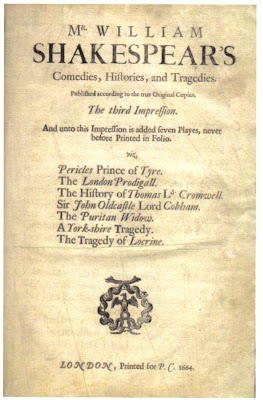To Dream Upon the Crown
 Another treasure from YouTube: John Barrymore as Richard Gloucester in Henry VI, Part Three. Barrymore was a triumph on stage in Richard III, but these passages from the earlier play provide the only glimpse on film of his approach to the character.
Another treasure from YouTube: John Barrymore as Richard Gloucester in Henry VI, Part Three. Barrymore was a triumph on stage in Richard III, but these passages from the earlier play provide the only glimpse on film of his approach to the character.The sequence opens with lines from the beginning of the play, with Richard proudly showing his father, the Duke of York, the severed head of the Duke of Somerset, an enemy who had allied himself with the Lancastrians in the Wars of the Roses. Left to himself, Richard contemplates the Yorkists' eventual victory over King Henry VI and in soliloquy shares with us his plans to displace his own brothers and seize the crown for himself (the speech concludes Act 3, Scene 2).
www.youtube.com/watch?v=tdy2sUKxfDE
Barrymore plays Richard as a charismatic monster, with the famous profile radically changed through makeup and sinister lighting. The voice, too, is deliberately altered, but Barrymore is still able to make thrilling music with Shakespeare's language. It's all deliciously, gloriously overdone.
The clip is taken from The Show of Shows, a revue directed by John G. Adolfi and produced by the Warner Brothers studio in 1929 to demonstrate the full potential of talking motion pictures -- musical numbers dominate the film. Barrymore himself introduces the scene, not in character, by suggesting parallels between Richard and 1920s mobsters like Al Capone (pronounced Capo-ne, by Barrymore).
www.youtube.com/watch?v=6J8dnh2kye4&mode=related&search=
Decades later, Al Pacino would play Richard on stage -- and later in his film Looking for Richard (1996) -- with obvious gangland resonances.
Plans for a full-length film production of Richard III starring Barrymore were never fulfilled. Instead, Warner Brothers made the first complete sound-film version of Shakespeare in 1935 with A Midsummer Night's Dream. The following year, Barrymore moved over to MGM to appear as Mercutio in Romeo and Juliet.


